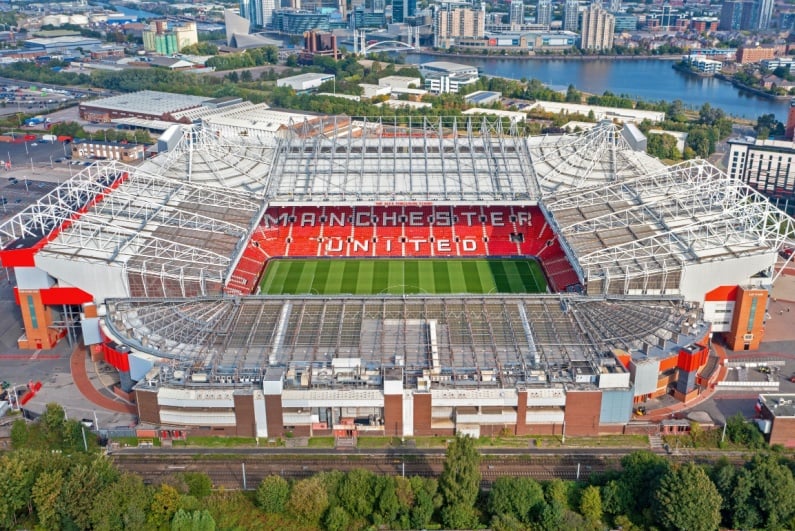Amorim mentions the R-word
It wasn’t the pundits or critics saying it. It was Manchester United’s manager – Ruben Amorim.
Relegation from the English Premier League (EPL) is a possibility for English soccer’s biggest and most decorated club.
just seven points clear of the EPL relegation zone
Amorin’s team had just lost 2-0 at home to Newcastle United, in front of their fans in their beloved home, Old Trafford. The defeat left them down in 14th place – a massive 23 points adrift of leaders Liverpool but, more worryingly, just seven points clear of the EPL relegation zone.
In a season in which they have already sacked one manager, Eric Ten Hag, the fall from grace continues. New manager Amorin has been unable to halt the slide and, in fact, the decline has hastened since his arrival.
Problems run deep
The conclusion therefore has to be, and indeed is, that the problems at Old Trafford run deeper than just the manager. Among other things, the players placed at the disposal of Ten Hag and Amorin are clearly not good enough.
To put their current predicament into perspective, the last time United was relegated from the top tier of English soccer was half a century ago, at the conclusion of the 1973-74 season.
Back then, the footballing landscape was very different, and while United was still considered a European soccer powerhouse, the financial disparity between English soccer’s “big six” and the rest was nowhere near as pronounced as it is today.
As things stand, United is one of just six EPL teams never to have been relegated since its launch back in 1992 but so poor is United’s form, as Amorin says, they have to face reality. They are on the outer edge of a relegation battle.
How poor is United’s form?
Monday’s defeat to Newcastle was their third in a row in the EPL and their fifth in their last six league games. It left them in 14th and only seven points above Ipswich Town which occupies 18th place – the closest relegation slot to EPL – following their 2-0 win against Chelsea at Portman Road on Monday night.
It is the lowest position United has held in the top tier of English soccer at the turn of the year since 1989 when they were in 15th place on New Year’s Eve. It was the early days of the Sir Alex Ferguson era and there was even talk then of the legendary Scot being fired.
Ferguson’s job was saved by them winning the FA Cup
As it transpired, United finished that particular season in a lowly 13th place, but Ferguson’s job was saved by them winning the FA Cup, with a victory over Crystal Palace in a final that needed a replay to separate the two teams.
Ferguson went on to become United’s greatest-ever manager, so all is not lost for Amorin, although the situation he has inherited is very different to the one Ferguson did.
United breaking records
The stats don’t lie. Since Amorim’s arrival at Old Trafford on November 24, the Red Devils have earned only seven points from a possible 24, with just two wins, one draw, and five defeats from eight EPL matches.
They are numbers that tell a very grim story and make for very unhappy reading for United’s millions of fans worldwide.
It gets worse. In December, United lost no fewer than six games in all competitions, making it only the third month in the club’s entire history in which they have lost so many. The last time was way back in 1962.
During December, United conceded 18 goals – the most they have conceded in a single month since March 1964 (also 18) – and since Amorim’s first game in charge only bottom-of-the-table Southampton (7) have lost more games in all competitions (7) than United.
It gets even worse.
The Newcastle defeat meant that United has now lost three consecutive home EPL games for the first time since way back in February 1979. They have also lost three consecutive EPL matches within the same campaign for the first time since December 2015, under the management of Louis van Gaal.
How many points does United need to avoid EPL relegation?
This is, of course, a tricky question as no two seasons are the same, but what we do know is that since the Premier League moved to a 38-game season back 1995-96, an average of 35.6 points have been needed to avoid the drop to the second tier.
Teams that finish the season in 17th place – one place clear of the relegation zone – have averaged around 38 points in order to stay in the league.
Last season, for example, Nottingham Forest survived in 17th place with a total of 32 points, which left them a full six points clear of 18th-placed Luton Town – the equivalent of two wins.
a meager average of only 1.15 points per game
United is currently on 22 points after 19 matches, which is the exact halfway point of the season – a meager average of only 1.15 points per game. If extrapolated across the second half of the season, they would finish with 44 points. Enough for safety.
But, and it’s a big one, United’s form since Amorim’s arrival has been significantly worse than it was under Ten Hag. The former Sporting Lisbon coach is currently averaging just 0.88 points per game and if they continue at that same rate in the second half of the campaign, they would end up with around 39 points.
That, in the words of Alex Ferguson, would be “squeaky bum time.”
Loads of work still to be done
Worth noting, too, is that in the 2002-03 season, West Ham United was relegated with 42 points – the highest tally recorded by a team that finished in the EPL’s bottom three in a 38-match season.
So, for Amorim and United there is much work to be done and certainly no room for complacency. The phrase “too good to go down” is one that’s often been used and invariably comes back to haunt those who say it.
As things stand, United is definitely not too good to go down.
But even if they do manage to avoid the drop, there are consequences when a club as big as United has a poor season. For example, missing out on winning a place in next season’s UEFA Champions League (UCL) would cost them multi-millions.
While the exact terms of their kit sponsorship deal with Adidas are unknown, it is rumored that, as part of that deal, failure to win a place in the UCL will cost them £10m. And that’s before the multi-millions that come as part of the UCL television deal are taken into account.
Money too tight to mention
United is already in a phase of cost-cutting – the effect of many years of financial mismanagement and a flawed transfer recruitment policy – but failure to earn a place in the UCL, or even either of the two smaller European competitions, would require more budget realignment.
At the extreme end of the scale, relegation would be an absolute nightmare for the club’s finance director Roger Bell. Part of that equation would be having to work with what is known as EPL parachute payments – sums of money paid to relegated teams to help assist with the dramatic drop in television income.
the impact of budgeting for a season in the second tier
While it is very much the worst-case scenario, it’s inconceivable that Bell will not be looking at the potential impact. If cost-cutting is an issue now at Old Trafford, imagine the impact of budgeting for a season in the second tier where there is a 46-game season, which includes many midweek programs and potentially trips to places like Plymouth, Oxford, and Portsmouth.
If the current situation in League One remains, then a trip to Wales to play Ryan Reynolds’ Wrexham club would be in the cards. The same Wrexham which, two seasons ago, was a non-league club. While that would be one for the Hollywood producers, it would be the stuff of nightmares for United.
A squad unfit for purpose
The reality is that four teams have been relegated from the EPL after being in 14th place at the turn of the year – the most recent being Leeds United two seasons ago.
As stated above, this is very much the worst-case scenario, but what is also clear is that against the current backdrop of cost-cutting, this United squad desperately needs an overhaul. Amorim is working with a squad that he himself knows is not fit for purpose.
And while the January transfer window is now open, it is an open secret that funds for new players will be hard to come by. The club lost no less than $142.05m in the financial year up to June 2024, so Amorim will, to a degree, have his hands tied.
Probably the best that he can hope for is to sell some players deemed surplus to raise funds that can then be used to bring in new players.
Sell to buy
The problem for Amorim is that those deemed surplus, or at least those who have had little game time, are of limited value.
Take Casemiro for example, a Brazilian legend who spent a stellar career at Real Madrid, but who is now little more than a passenger in the EPL but still has 18 months left on his contract.
lasted just 33 minutes of the Newcastle game
Or Joshua Zirkzee, a Dutch international who signed for $45.8m from Bologna in the summer and was given a five-year deal. He lasted just 33 minutes of the Newcastle game before being replaced by Kobbie Mainoo, a decision that was applauded and celebrated by the home fans. It was an excruciating moment for all concerned.
And then there is the issue of Marcus Rashford. The England international striker finally returned to the matchday squad against Newcastle after a four-game absence, but made it no further than the bench. Even with United in dire need of a goal and three EPL games without a goal, Amorim decided against using him.
So, questions remain around Rashford’s future, but his current form and lack of game time will impact the fee United can demand.
Five managers, two CEOs, one set of owners
In short, Amorim and United’s team of sporting directors have a tricky balancing act to perform over the coming 30 days: to reinvigorate an ailing squad, but by not spending very much money.
But, as mentioned earlier in this piece, these problems have been building for a long time and not since the departure of Ferguson in 2013 has United looked like a superpower.
Upon his departure, Ferguson famously asked United fans to “stand by our new manager”, citing his own difficult start at the club and therefore the need for patience.
But it has been easier said than done. Since then, United has gone through five permanent managers, two CEOs, and one group of owners, the Glazers.
In total, they have spent a cool $1.79bn on transfers and $50m on new managers while concurrently running up debts totaling nearly $1.25bn. And all while not getting even close to winning the title.
Once upon a time, the United ethos was “attack, attack, attack” and they were the EPL’s great entertainers but now there is no identity either on or off the pitch.
Decade of turmoil
The problem is currently Amorim’s, but he is merely the latest in a long time to suffer at the hands of a club that has major structural and cultural issues.
Ferguson’s call for patience has never been stress-tested more
A decade of turmoil shows little sign of abating, but United’s current low point may be what is needed for the club’s decision-makers to finally act. There is, of course, no quick fix and Ferguson’s call for patience has never been stress-tested more than it is right now, but the giant that is Manchester United needs reform from top to bottom.
And it has to start now, otherwise the second tier could be home in 2025-26.




